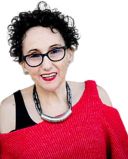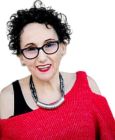Career
19 Years After Her Death, I’m Ready to Write a Letter to Mom
Happy Mother’s Day.
Posted May 9, 2021 Reviewed by Jessica Schrader
March 6 was the 19th anniversary of my mother’s death from pancreatic cancer. I’m already anticipating how difficult next year will be. In Judaism, on the eve of the anniversary, tradition dictates that we light a Yahrzeit candle in her memory. The Yahrzeit is a small white candle encased in a glass container. It burns for 24 hours. I never lit it while I had my cats because I was concerned about having an open flame while I was sleeping. That fear has remained, so when I would normally light the candle I look upward, whisper to her and I know she understands. She would have loved Shelby, my rescue dog.
What is hitting me so hard about her death is when she passed away, she was 68 and I entered my 60s this past February. I’m 60 and my mom never made it out of her 60s. True she smoked like a fiend and worked like a whirlwind and was overweight, but my physical health isn’t exactly stellar.

Through my work with my psychiatrist, Dr. Lev, and my foray into entrepreneurship, my thoughts and feelings have been swirling around and I miss her in a different way. It’s time to communicate everything in the manner I’m most effective—the written word.
Dear Mom:
I came to understand your unrelenting drive to succeed and incredible work ethic as stemming from a combination of factors, beginning in childhood, followed by being stuck in a lousy marriage with a man who was an alcoholic and most likely had schizoid personality disorder. You also suffered grestly as you watched me endure decades of severe mental illness, something I did not comprehend at the time. After you died, your friend Z.. told me you lived in a constant state of terror I’d attempt suicide again—and succeed. Z.. told me when you were making your own arrangements for your death, including purchasing a cemetery plot, you bought the adjoining plot for me. Were you so sure I’d end up killing myself and/or that I’d never find a partner with whom to share my life?
Did you know back then that the way in which Daddy interacted with me as a young girl would screw me up for life so I would never be capable of an intimate relationship?
I know you loved Daniel and me with everything you had. But I also believe that if you believed you had a choice back in 1960 when the norm was for a woman to get married and have babies, you would have chosen not to have kids.
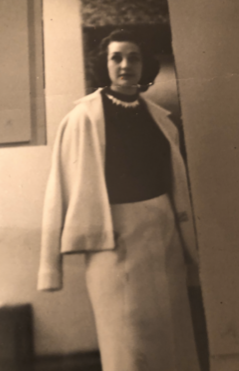
You were brilliant. You were one of the few female computer programmers in the country. And you gave that up to raise me and, 18 months later, Daniel. How could you not resent this situation you found yourself in, trapped in a small apartment on Austin St. in Queens, NY with screaming babies (two in two years) and an alcoholic husband, who got loaded on the bar car of the Long Island Railroad on his way home every night? How could you not close your eyes and wish to be transported back to the offices of Remington Rand in Manhattan where the order and the precision of the UNIVAC (Universal Automatic Computer) awaited you?
No wonder you choose to have two illegal abortions after Daniel was born. Roe v. Wade was not passed until 1973.
You left Dad my senior year in college and you went back to school to learn what was current in computers. I inherited my perfectionistic tendencies from you. Not many people know this, but you told me. You went to work in the programming department at a company that facilitated focus groups on Long Island. When you didn’t get all “excellents" on your six-month review, you quit and started your own custom software development company.
Then your 26-year-old daughter turned into a skeleton. She did not know, she would never hear it from your lips that her mother had been bulimic since she was 15. Why did you keep it a secret? Because eating disorders thrive in isolation and in stealth.
We now know what we didn’t know then, is that eating disorders have a genetic component. Would that have made you feel better or worse?
Were you ashamed Mom? I wouldn’t have judged you or thought less of you. You were—and are—my hero.
Two long hospitalizations (six months and four months) later, I lost my career. I continued to be entrenched in the anorexia. I’d risen through the ranks from a secretary at an advertising agency to a Consumer Promotion Development Manager at one of the largest packaged goods companies in the world. Along the way, I’d become addicted to cocaine. I’m not sure if you ever knew that.
I will never forget the sight of you and Daddy standing at the end of the stretcher in a midtown Manhattan hospital. You and he were standing shoulder-to-shoulder in the crowded ER. It was the first time I’d seen you and him that physically close since I was a child. Your face was white, your eyes were frozen wide open in fear.
It was on the psych unit in that hospital I was diagnosed with borderline personality disorder (BPD). In 1990 there was no internet. We had to rely on what the psychiatrists told us. The prognosis was poor.
Your love for me was always unconditional. Your support never wavered. I loved you so much.
We had a game. When I stayed at your house in Connecticut, before we went to bed, I’d say
Love you and you’d say back Love you more. We did this for years and it never got old.
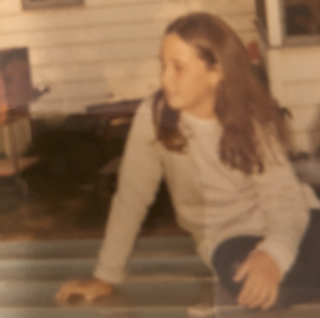
I put you on a pedestal. At the same time, I got the most attention from you when I was sick, even as a child. Strep throat and chickenpox. Pneumonia with a 106-degree fever. Anorexia was a psychiatric illness you could see, unlike depression or BPD. But you could see the cuts on my body I made with my razor blades.
We could have remained enmeshed indefinitely. I got my master’s degree in social work. I’d go to your office with you on Saturdays and you’d work and I’d study. Side-by-side.
You chain-smoked four packs of cigarettes as a way to deal with my illness. Daniel, who joined your company in the late 1990s, wouldn’t step foot in your office because there was a constant cloud of cigarette smoke hovering. You lit a new cigarette with the tip of the one you just finished.
You ate out every night or brought food in. You were overweight. And you never went to the doctor. By the time you went to see him, you were dying. They gave you six months. You died after three. In March of 2002.
I was lost. For years. I never had to stand up before. And stand-alone. I hadn’t made any friends because you were my best friend and the only one I thought I needed.
Baby steps. Steps forward. Steps back. A major depressive episode from 2005 through 2008 during which I was hospitalized six times and received a course of electroconvulsive therapy. I felt abandoned by you, even three years after your death. I kept a couple of your extra-large sweaters so I could wrap them around my body, drawing my knees up to my chest and make myself into a sweater-ball. I pretended you were in there with me.
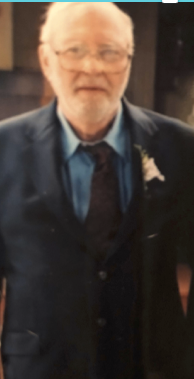
Dad died in 2013. I thought I’d be relieved, but I couldn’t handle the resentment and rage that had bottled up inside me and I tried to kill myself 11 months later. Mom, I needed you then and I couldn’t find you.
I made it through that year and Daniel and I became closer than ever, which is what I know you always wanted. And now that I was free of the anger that had encapsulated me, I had room to grow.
I realized if you and I had continued to be enmeshed, I’d be like a Christmas tree folded down to fit on top of a car for the ride home. It was painful for me to admit, but our relationship was not healthy for either of us. I missed you, but I eventually began to thrive.
My biggest regret is that you and I were never able to have a mother-daughter relationship as two healthy adults. I know you are proud of me and you are guiding me on my entrepreneurial journey because who better?
Love you more.
Thanks for reading.
Andrea

